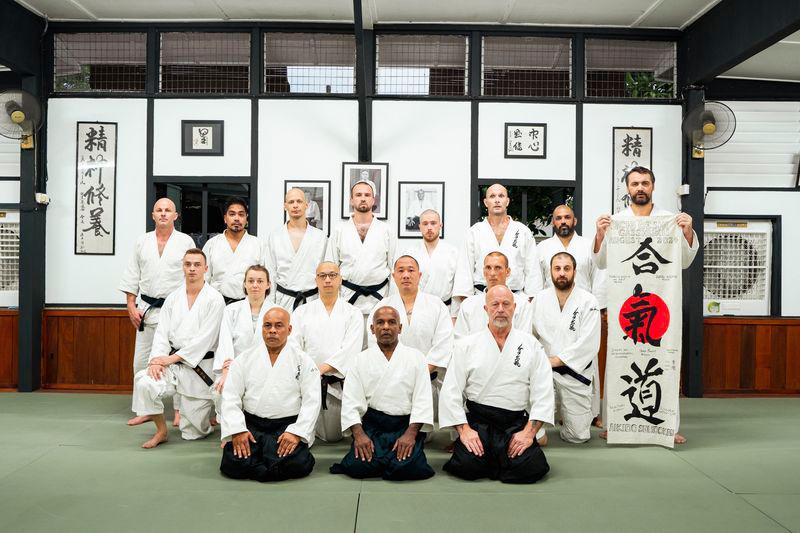SEREMBAN: The Shudokan, the very first Aikido dojo (school) in Malaysia founded in 1961 by the late Malaysian martial arts icon Thamby Rajah Sensei (teacher), continues to stand strong through decades of change, adapting to the evolving world while remaining deeply rooted in the traditions of Aikido.
Also being the first Aikido dojo outside of Japan, The Shudokan has weathered social, cultural, technological shifts, and even COVID-19, continuing to thrive due to its unwavering commitment to discipline, respect, and community. Under the guidance of Joe Thambu Shuseki Shihan (chief instructor) of Aikido Shudokan International and a dedicated network of instructors.
The Shudokan has expanded internationally, yet it remains grounded in the core values established by its founder and Thambu’s uncle, Thamby Rajah, who’s also known as Malaysia’s father of Aikido.
Its longevity is a testament to the enduring relevance of traditional martial arts in shaping individuals and communities, even in modern times.
Thambu emphasised the importance of Aikido in fostering community, discipline, and resilience, saying, “Aikido goes beyond martial arts; it is about building harmony within oneself and the community. It teaches us to respect others while developing inner strength.
“As a global Aikido family, we are proud to continue sharing this art with students around the world.”
The Shudokan held a two-week immersive training camp called the Uchi Deshi Gasshuku, which took place from August 11 to 22, saw 14 dedicated Aikido practitioners from around the world gather for an intensive training experience under the watchful eyes of Thambu.
Thambu explained that the term Uchi Deshi is Japanese for “live-in student”, totally immersing themselves in Budo (The Martial Way).
Traditionally, an uchi deshi would apprentice him or herself to a master teacher and live in the dojo or the home of the teacher, serving them all day, every day.
“An uchi deshi’s training does not only take place on the mats but through the way an uchi deshi conducts their daily life, he or she strives to cultivate a greater understanding of martial techniques and spirit,” said Thambu, who shared how back in the day where his uncle, who started his Budo journey in 1952 and began teaching in 1956, would welcome international guest with open arms and conduct almost similar training camps.
“I fondly remember the good old days when the dojo grounds would be very lively, and the spirits would be high as we train our hearts out. Seeing so many people coming together to train is a testament to the lasting legacy my uncle built, and I hope to continue this tradition he started,” he added.
Aikido Shudokan Malaysia chief instructor Ramlan Ortega, who assisted Joe Thambu Shuseki Shihan during the Uchi Deshi Gasshuku, also highlighted the benefits of Aikido for the Malaysian community, noting, “Aikido teaches both physical and mental discipline.
“It helps individuals manage stress and conflict, making it a valuable skill set for Malaysians looking to improve their personal well-being and relationships with others.”
“I look forward to more such programs such as the Uchi Deshi Gasshuku happening here and becoming an eye-opener for Malaysians on Aikido,” he added.
Ramlan also just recently celebrated 30 years of doing Aikido with a seminar just after the Uchi Deshi Gasshuku from August 23 to 25.
The participants from across the globe – Malaysia, Indonesia, Singapore, Hong Kong, Australia, United Kingdom, Poland and Czech Republic – found the training camp a memorable and worthwhile experience.
Noveen Mannath, one of the selected practitioners of this camp and the only Malaysian to take part, expressed his gratitude for the opportunity.
“Fourteen of us began this journey, and fourteen of us finished it together as one. We got on each other’s nerves, were pushed beyond our limits, and were injured—some more than others. Yet, despite it all, we persevered.
“The word “perseverance” now holds a deeper meaning for me, as does the word “friendship.” I honestly don’t think I could have made it through the program without these companions by my side,” he said.
Aikido Shudokan Indonesia chief instructor Mark Hadiarja who among those selected for this camp, echoed this sentiment, adding, “The camaraderie and dedication shown by everyone were inspiring. The experience has strengthened my commitment to sharing Aikido in Indonesia and upholding the values taught at The Shudokan.”
Looking ahead, Thambu says to expect more upcoming programs held at The Shudokan, including an exclusive five-day Seminar on Advanced Tanto Manipulation and Aiki Goshinjitsu from December 13 to 17.
This seminar will feature Paul Cale and David Dangerfield, both esteemed Aikido instructors from Australia, and will delve into advanced self-defence techniques.
Thambu closed by expressing his hopes for Aikido’s future in Malaysia, urging support for traditional martial arts like Aikido.
“We hope Malaysians continue to help us preserve and grow these traditions, especially schools like The Shudokan, which carry a rich heritage. It is our collective responsibility to keep these arts alive for future generations.”









